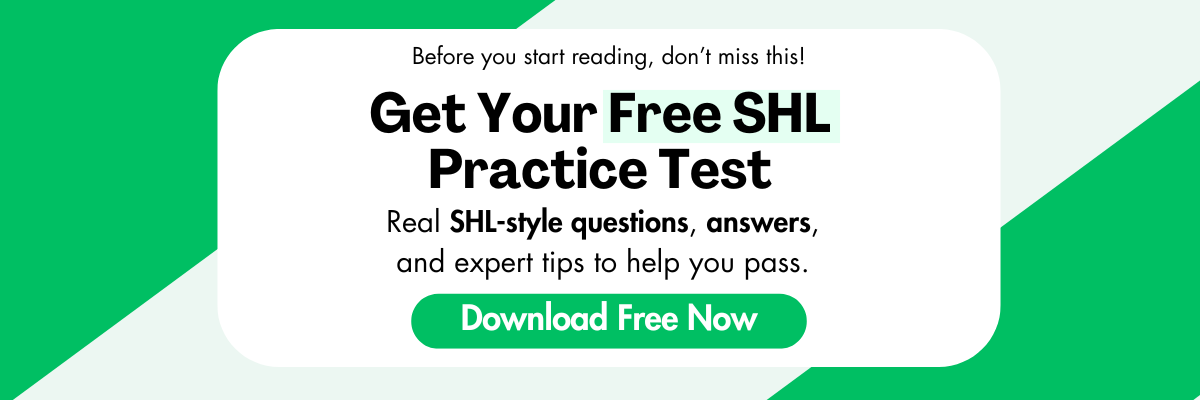
SHL Deductive Reasoning: Test Sample and Guide
Oct 10, 2022
The company Saville and Holdsworth Limited (SHL) is well known for making psychometric tests.
The SHL tests are available in over 150 countries and have been translated into around 30 languages.
The SHL Deductive Reasoning Test is administered online and is designed to evaluate job candidates' problem-solving skills.
It’s used by some big companies as part of the hiring process, like Amazon and Microsoft, and could be the barrier between you and your dream job.
The test requires using logic to make decisions based on the presented information. Find sample practice tests for the SHL Deductive Reasoning Test right here at TestHQ.
Getting a good score could be the way to land you the perfect role.
In this article, we’ll focus on the SHL Deductive Reasoning Test. We’ll give you some examples of the types of questions that come up and tips on how to best prepare for the test.
What Is the SHL Deductive Reasoning Test?
The SHL Deductive Reasoning Test is designed to evaluate job candidates' problem-solving skills. It requires using logic to make decisions based on the presented information.
It is used by many companies as part of the hiring process and is done online.
- Deductive tests show candidates written statements and the possible results. You're asked to figure out which one is correct. As you're given options, you don't have to think as freely, but you have to use some logic to figure out the only possible outcome.
- Inductive tests, on the other hand, require you to think logically to find patterns in a series of graphics. Due to the strict time limit, you need to be precise and work quickly.
Aside from the deductive reasoning tests, there are seven other SHL tests that can be administered to job applicants.
These include:
- SHL Inductive Reasoning Test
- SHL Verbal Reasoning Test
- SHL Mechanical Reasoning Test
- SHL Numerical Reasoning Test
- SHL Management and Graduate Item Bank (MGIB)
- SHL Comprehension Reading Test
- Bespoke Ability Test
What to Expect in the SHL Deductive Reasoning Test?
The SHL Deductive Reasoning Test is offered in two versions. The version of the test you take will be determined by the company to which you applied and the level of the job you desire. Both versions are taken unsupervised.
The SHL Verify G+ Deductive Reasoning Test (Interactive) is an 18-minute test with 12 interactive questions.
The SHL Verify G+ Non-Interactive Deductive Reasoning Test (Non-Interactive) has 18 multiple-choice questions and takes 20 minutes to finish.
The interactive test is to be finished in one sitting, while the non-interactive test has an extra verification test.
The candidate must take a shorter version of the original test again in the optional follow-up verification test.
The evaluators can use this to look at the candidate's response patterns and consistency to make sure that the same person took the first test.
While the two test formats are different, both aim to assess the same abilities. In the interactive test, you’ll be shown scheduling questions and ranking questions.
You will have to use the drag-and-drop method to solve these. In the non-interactive test, you'll be asked multiple-choice questions with five possible answers, one of which is the right one.
SHL tests generally consist of approximately 20 questions and last between 15 and 20 minutes.
It is an online exam. The test is frequently used in the hiring process.
Examples of the SHL Deductive Reasoning Test
Here are some example questions for the non-interactive SHL Deductive Reasoning Test.
Deductive and Conclusions-Based Questions
Question 1:
Review the information below:
Simba is a healthy cat.
Mylo is a black dog.
There are no dogs in New York.
Some healthy dogs are vaccinated fully.
All healthy cats are vaccinated fully.
Based on the above information, which of the following is true?
a) Simba lives in New York.
b) Simba is fully vaccinated.
c) Mylo lives in New York.
d) Simba and Mylo live in the same city.
e) Mylo is vaccinated once a year.
Question 2:
Review the information below:
Roger lives in a big apartment.
Sam lives in a small apartment.
There are no big apartments in Cityville.
Small apartments have one bedroom.
Based on the above information, which of the following must be true?
a) Roger lives in Cityville.
b) Sam lives in Cityville.
c) Big apartments have one bedroom.
d) Roger and Sam live in the same town.
e) Sam’s apartment has one bedroom.
Question 3:
Five pandas – Lun Lun, Mei Xiang, Gu Gu, Lin Bing and Lin Hui – are kept in three adjacent rooms numbered one to three from left to right.
There is at least one panda in each room.
Mei Xiang is in a room to the left of Gu Gu's.
Lin Bing and Lin Hui are not kept in the same room.
Either Lin Bing or Lun Lun, but not both, are kept in room two.
Lin Hui is kept in room three.
A sixth panda, Mei Lan, is brought into either room two or three. If there are now two bears in each room, which one of the following must be true?
a) Mei Xiang is kept in room one.
b) Lun Lun is kept in room two.
c) Lin Bing is kept in room two.
d) Mei Lan is kept in room three.
e) Gu Gu is kept in room three.
The correct answers are:
1. b). We know Simba is a healthy cat and that all healthy cats are fully vaccinated. Therefore, Simba must be fully vaccinated.
2. e). From the information, we know that Sam lives in a small apartment and small apartments have one bedroom. Therefore, Sam’s apartment must have one bedroom.
3. a). Gu Gu is in room two. Mei Xiang must be in room one.
Underlying Assumptions-Based Questions
Question 1:
'A jewellery factory made 500 bracelets last month, and 575 the month before. Therefore, raising the workers’ salaries helped to improve productivity.'
Which assumption underlines the argument above?
a) The factory makes around 500 bracelets each month.
b) The factory made around 550 bracelets two months ago.
c) The factory used to produce less than 500 bracelets each month.
d) The factory has sold more bracelets in the last two months.
e) Raising workers’ salaries always results in more productivity.
Question 2:
'Botanists are working hard to develop a type of plant that can survive in dry places. They think this is important even if the project doesn't teach them anything about genetic engineering that they couldn't have learned another way. They say that we will need the biotechnical knowledge that this project will give us about how to grow flowers in a hot, dry environment in the future, when global warming worsens.'
Which one of the following is an underlying assumption of the argument above?
a) All areas will be affected by drought because of global warming.
b) Even when global warming gets worse, people will still grow plants.
c) This project will be successful in making a new kind of plant.
d) In the future, there won't be enough water to water plants due to climate change.
e) A drought-resistant plant species won't need to be watered as often.
The correct answers are:
1. c). The factory has produced a minimum of 500 bracelets each month over the past two months and we are informed this is an increase to productivity. Therefore, the factory must have produced fewer than 500 bracelets each month before.
2. b). The last line assumes people will be growing plants even when global warming worsens and will need knowledge on how to grow them in hot, dry environments.
Access Practice Material With TestHQ
How did you do with the example questions? If you were stronger at some sections over others, focus your practice on where you need it most.
For a huge range of practice material, take advantage of the TestHQ SHL Deductive Reasoning practice tests to access more than 800 questions and answers.
The package includes full solutions and explanations, so you can understand how to get to the correct answer and avoid those dreaded point deductions.
When Are SHL Deductive Reasoning Tests Used?
SHL Deductive Reasoning Tests are often used during recruitment drives for companies, as well as some applications for educational institutions.
Some businesses that use SHL tests are:
- Amazon
- BAE Systems
- Bayer
- Credit Suisse
- Danone
- Heineken
- Microsoft
Even though this test is more suited for high-skilled jobs, the SHL Deductive Reasoning Test can be used for any jobs.
There's a good chance you'll be asked to take this test if you're applying for a job where you'll need to be able to think critically and make quick decisions with limited information.
The tests are usually conducted before the interview stage of the process since recruiters won’t want to waste time interviewing people who aren’t suited to the role.
They’re often done at home, but some companies may wish for them to be administered at a test centre. However, the SHL Deductive Reasoning Test will always be conducted online.
Why Are SHL Deductive Reasoning Tests Used?
During the hiring process, hiring managers and recruiters often use the SHL Deductive Reasoning Test to choose potential employees who have problem-solving skills, are calm under pressure and can work to deadlines.
Most employers want to hire people who are good at logical and deductive thinking.
Many employers use these tests to evaluate the skills of applicants and make sure they hire the best people for the role.
Employers are looking for individuals who can make good arguments and come to well-thought-out conclusions.
They can also be used to assess how a candidate thinks. Managers can use this to find out whether or not the candidate thinks along the same lines as other team members.
Preparing for these tests can also show that the candidate has organisational skills and is prepared for anything unexpected.
The purpose of the test is to give you a score that will be compared to those of other applicants. Those who receive a high score will be considered top candidates for the position.
The candidate's overall assessment score is based on how well they did on the test, how fast they were, how accurate they were and how alert they were.
After you finish the SHL deductive test, you'll get a Candidate Assessment Report with your score. Your test score will range from A to E.
Here’s a breakdown of the scores and percentiles:
|
Score |
Percentile |
Result |
|
A |
90–100 |
Well above average |
|
B |
70–89 |
Above average |
|
C |
30–69 |
Average |
|
D |
10–29 |
Below average |
|
E |
0–9 |
Well below average |
The closer you are to group A, the higher the score you receive. Those who get scores in groups A and B will likely pass the test and can progress to the next stage.
How to Prepare for Deductive Reasoning Tests
Deductive reasoning tests are not difficult when candidates have prepared for them. Here are some ways you can practise for the SHL Deductive Reasoning Test.
Practise the Test Online
The best way to practise is by using online tests that are available. You can find example SHL Deductive Reasoning practice tests on TestHQ.
Practise Under Timed Conditions
The deductive reasoning tests also assess the speed and accuracy of the candidate. Since these tests are conducted under strictly timed conditions, it’s important to practise in this type of environment.
Understand the Question Types
It is important to know how to answer each type of question, such as syllogisms, arrangements and questions with hidden assumptions.
You have the best chance of doing well if you train your brain to answer these kinds of questions.
Unfortunately, you won’t always be made aware of whether you’ll be required to take the interactive or non-interactive version of the test.
Therefore, it’s advised that you get familiar with all types and formats of questions that could come up.
Read the Questions Carefully
The questions aren't meant to trick you, but you may need to read them more than once to understand them.
You should also be careful not to read too much into the questions. The test doesn't require you to read between the lines – just work with the information presented to you.
Use a Range of Problem-Solving Strategies
We all work in different ways, and there are many ways to get to the same right answer.
Try out some different ways to solve the problems. A good way to do the deductive reasoning test is to use elimination. Some people also feel better when they draw on paper. Just don't waste too much time on this.
Forget Prior Knowledge
These tests are meant to assess how well the candidate understands the information given to them, not how much they already know.
So, the candidate must only use the information the test gives them.
Get Plenty of Rest
Being tired, hungry or thirsty can affect performance. You should always mentally prepare yourself for the test.
Get plenty of rest the night before the test, wake up early and take time to relax before doing the test.
Frequently Asked Questions
Is the SHL Deductive Reasoning Test difficult to pass?
The SHL Deductive Reasoning Test is not difficult to pass if you’ve prepared for it. Being familiar with the types of questions that come up is the best way to succeed on the test. You can find example tests on TestHQ.
What is the passing rate for the SHL Deductive Reasoning Test?
There is no clear, set pass rate for the SHL Deductive Reasoning Test. It depends on the company and the role you’ve applied for. Generally, you’ll proceed to the next stage if you score among the top 20%, or receive a grade of A or B on the test.
What is a good score for the SHL Deductive Reasoning Test?
Normally, a ‘good score’ on the SHL Deductive Reasoning Test would be an A or B, which would mean you have scored among the top 20% of candidates.
Increase your chances of getting a good score on the SHL Deductive Reasoning Test by getting plenty of practice. Find example tests right here on TestHQ.
Can you fail the SHL Deductive Reasoning Test?
There is no pass or fail score on the SHL Deductive Reasoning Test since it’s scored comparatively. However, a pass mark or a score high enough to progress is often a score in the top 20% of candidates or a score of an A or B.
When will I know my test results for the SHL Deductive Reasoning Test?
Since the test is administered online, your results are generally ready immediately. However, you may not always be given your results since the employer may keep them to compare the candidates’ results. You may request your results, but there’s no guarantee they’ll be shared with you.
Where can I find more sample questions for the SHL Deductive Reasoning Test?
You can find more sample questions for the SHL Deductive Reasoning Test on TestHQ.
What companies use the SHL Deductive Reasoning Test in the recruitment process?
Some companies that use the SHL Deductive Reasoning Test in the recruitment process are:
- Amazon
- BAE Systems
- Bayer
- Credit Suisse
- Danone
- Heineken
- Microsoft
What is the purpose of the SHL Deductive Reasoning Test?
Companies often use the SHL Deductive Reasoning Test to choose potential employees who have problem-solving skills, are calm under pressure and can work to deadlines.
Final Thoughts
SHL Deductive Reasoning Tests are popular among several employers, and should always be prepared for.
Remember that the tests are always administered online and you may be requested to complete one with very little notice.
Being prepared for the test will reduce stress on the day and can improve your performance on the test.
Feeling prepared and relaxed during the test can be what makes the difference between you and another candidate progressing for the role.
Make sure to get plenty of practice before taking the test. Find example tests on TestHQ, and get on your way to landing your dream job.







